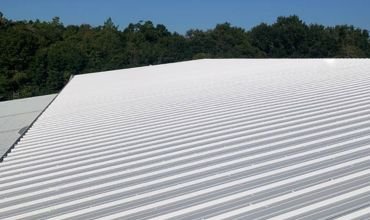These have become a popular and practical roofing material due to their exceptional durability, flexibility, and resistance to harsh weather conditions. These membranes offer a long-lasting, low-maintenance solution for various roofing applications, from residential homes to commercial buildings. This page will give you all the details of the silicone membrane that will help you make your final decision. You will know about the benefits of silicone membrane roofing.
Furthermore, you will learn about the various applications of silicone membranes, from residential and commercial buildings to industrial facilities and green roofs. Our expertise, experience, and commitment to quality artistry make us the ideal partner for your roofing project.
What is a Silicone Membrane Roof?

A high-quality silicone rubber layer is applied to a proper substrate, creating a flat roofing system. This membrane forms a seamless, waterproof barrier that protects the underlying structure from moisture, UV rays, and other environmental factors.
Key Benefits of Silicone Membrane Roofing
This section outlines the key benefits of silicone membranes and highlights their performance and advantages over other roofing materials.
Outstanding Durability
It is known for its excellent durability and ability to fight extreme climate situations. They are immune to high winds, heavy rainfall, extreme temperatures, and UV rays, ensuring a long-lasting and trustworthy roofing solution. Unlike other roofing materials that may rust or stain over time, silicone membranes maintain their structural goodness and performance, providing peace of mind for building owners.
Best Flexibility
Another key benefit of silicone membranes is their superior flexibility. They can grow and contract with temperature differences, minimizing the risk of cracking or tearing. This adaptability is essential for stopping leaks and maintaining the roofing system’s integrity. It can adjust the movement caused by thermal expansion and contraction, ensuring a durable roof.
Incredible Water Resistance
It creates a highly water-resistant barrier, preventing moisture from penetrating the roof and causing damage to the structure. This is especially important in regions with heavy rainfall or snow. Silicone membranes’ seamless and waterproof nature effectively protects the building from water infiltration, reducing the risk of mold, rot, and other moisture-related issues.
UV Resistance
Silicone is naturally resistant to UV rays, ensuring the membrane maintains its strength and performance over time. This is crucial for preventing degradation and early aging of the roofing material. Exposure to UV radiation can cause other roofing materials to become brittle, crack, or fade, but silicone membranes remain intact and durable even under long sun exposure.
Chemical Resistance

It’s resistant to a wide range of chemicals, making them suitable for industrial and commercial applications where exposure to corrosive substances is a concern. Chemical resistance is crucial for industries like manufacturing, chemical processing, and pharmaceutical production, where roofs face exposure to various chemicals and pollutants.
Low Maintenance
Silicone membranes require minimal maintenance, reducing long-term costs and ensuring a hassle-free roofing experience. Unlike other roofing materials that may require frequent repairs, repainting, or resealing, silicone membranes generally only need periodic inspections and minor repairs if necessary. This low-maintenance nature makes silicone membrane roofing cost-effective and suitable for building owners.
Energy Efficiency
Silicone membranes can improve a building’s energy efficiency by providing better insulation and reducing heat loss or gain. This will reduce your hassle by leading to lower energy bills and a more relaxed indoor atmosphere. By reducing heat transfer through the roof, silicone membranes can help maintain a consistent temperature inside the building, reducing the need for extreme heating or cooling.
Environmental Friendliness
Many are considered environmentally friendly due to their low VOC emissions and long lifespan. You can also recycle them, which will decrease waste and lessen the impact on nature. They offer a sustainable roofing solution compatible with green building practices, contributing to a healthier and more sustainable future.
Silicone Membrane Applications

Silicone membranes are a versatile roof repair solution that is used for a variety of commercial and residential applications. They are well-suited for flat roofs but can get used on roofs with a slight slope. Silicone membrane roofing offers numerous advantages, including:
- Commercial buildings—Silicone membranes are a popular choice for commercial roofs, such as those of office buildings, retail stores, and warehouses.
- Residential homes – It can also be used on residential roofs, especially for flat roofs.
- Industrial buildings—This is a good choice for industrial buildings that are exposed to harsh chemicals or extreme temperatures.
- Green roofs can be used on green roofs to create a watertight barrier and protect the plants.
Installation of Silicone Membrane Roofing
Silicone membrane roofing is applied using a spray-on method. Someone first cleans and prepares the roof, then sprays the silicone membrane in a thin, even layer. The membrane is allowed to dry and cure for some time and then sealed with a topcoat.
Maintenance of Silicone Membrane Roofing
It requires very little maintenance. However, it is crucial to inspect the roof regularly for any signs of damage or wear. If any repairs are needed, the contractor who installed the membrane can easily make them.
Choosing a Silicone Membrane Roofing Contractor
When considering silicone membrane roofing, carefully consider these factors to ensure the best possible outcome for your project. These factors include:
- Climate and Weather Conditions– Check the climate in your area, including average temperatures, rainfall, and UV exposure. Silicone membranes are generally resistant to extreme conditions, but it’s essential to choose a membrane that can withstand the specific climate in your region.
- Roof Type and Condition – Consider the shape and condition of your existing roof. These applications are adaptable to different roof types, but their suitability depends on the existing structure.
- Building Usage and Requirements – Assess the planned use of the building and any exact requirements such as foot traffic, weight restrictions, or noise reduction.
- Cost and Maintenance – Compare the initial cost of silicone membrane roofing to other roofing options, considering factors like material cost, installation fees, and potential incentives.
- Warranty and Guarantees – Check the warranty offered by the manufacturer and installer. A longer warranty can provide added peace of mind and protection against possible issues.
- Environmental Considerations – If sustainability is a priority, consider the environmental impact of silicone membrane roofing. Some manufacturers offer eco-friendly options with reduced VOC emissions and recyclable materials.
A Final Word!
With all the information above, it’s clear that silicone membrane roofing offers a durable, reliable, and aesthetically attractive solution for your home or commercial building. Its excellent resistance to weathering, UV rays, and chemicals makes it a long-lasting investment. If you’re looking for a roofing system that combines performance, durability, and low maintenance, silicone membrane roofing is an excellent choice. To make sure that you get the best installation and lasting care, consider choosing Manage My Roofing, a trusted provider with expertise in silicone membrane roofing solutions.
FAQs Section
A type of roofing material that uses a liquid silicone polymer to form a seamless, waterproof membrane.
Its benefits include durability, a long lifespan, flexibility, resistance to extreme weather, and low maintenance.
If you want the best installation, hiring a professional is the way to go, though it’s possible to do it yourself.
Silicone membrane roofing requires very little maintenance, usually just inspections for damage.
Yes, it’s highly resistant to wind, rain, snow, and temperature fluctuations.

Leave a Reply